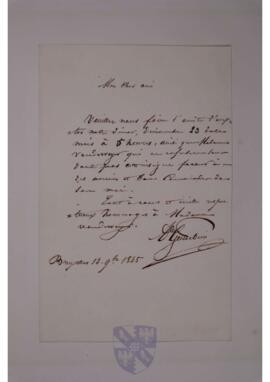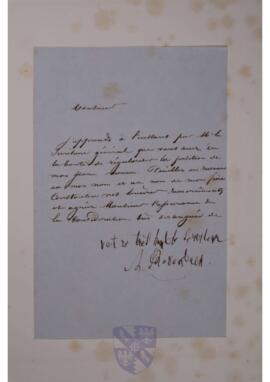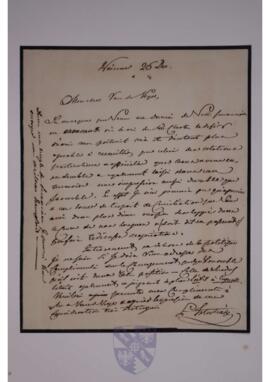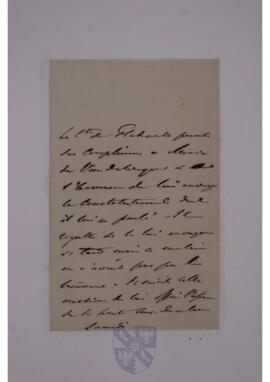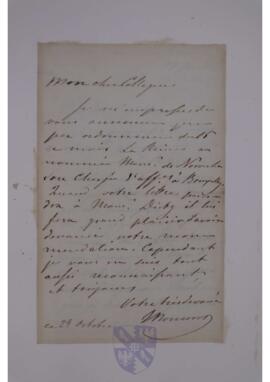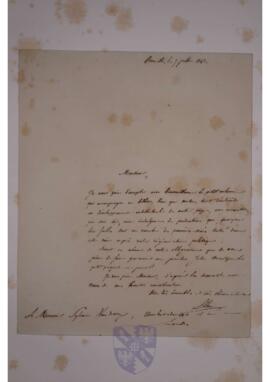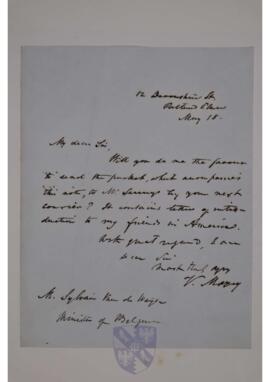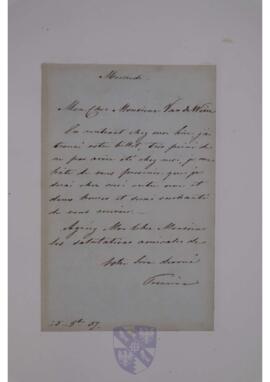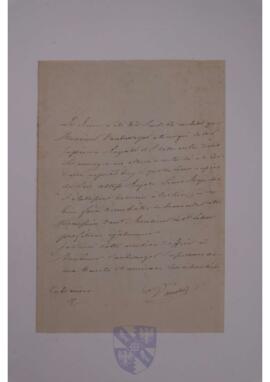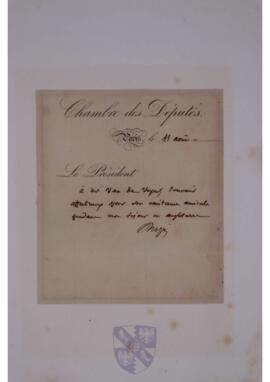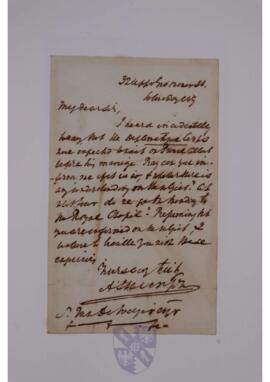Autograph letter in French, addressed from "Bruxelles", signed, to Jean-Sylvain Van de Weyer.
Van de Weyer, Jean Sylvain (1802-1874), diplomatAutograph letter in French, signed, to Jean-Sylvain Van de Weyer. The letter is in two hands, one of a copyist for the main part of the letter, and Rodenbach’s hand for the signature (Rodenbach was blind).
Van de Weyer, Jean Sylvain (1802-1874), diplomatAutograph letter, signed, to Elizabeth Van de Weyer asking if Isabella can call on her after the ball.
Van de Weyer, Jean Sylvain (1802-1874), diplomatLetter from Alwyn Scholfield on King's College embossed paper.
He had heard from [Arthur] Sayle that he [Mallory] was in Cambridge but due to leave for Charterhouse the following day. He is disappointment that they won't be able to meet as he had been looking forward to hearing Mallory's opinion of Charterhouse. He hopes that Mallory is enjoying his position and not finding it too laborious.
Autograph letter in French, signed, to Jean-Sylvain Van de Weyer.
Van de Weyer, Jean Sylvain (1802-1874), diplomatAutograph letter in French, to Jean-Sylvain Van de Weyer.
Van de Weyer, Jean Sylvain (1802-1874), diplomatAutograph letter in French, signed, to Jean-Sylvain Van de Weyer.
Van de Weyer, Jean Sylvain (1802-1874), diplomatAutograph letter in French, signed, to Jean-Sylvain Van de Weyer.
Van de Weyer, Jean Sylvain (1802-1874), diplomatAutograph letter in French, signed, to Jean-Sylvain Van de Weyer.
Van de Weyer, Jean Sylvain (1802-1874), diplomatAutograph letter, signed, to Jean-Sylvain Van de Weyer, in which the author requests Van de Weyer to write to the Belgian Prime minister, on behalf of a relative.
Van de Weyer, Jean Sylvain (1802-1874), diplomatAutograph letter in French, addressed from "Bruxelles", signed, to Jean-Sylvain Van de Weyer. The author offers Van de Weyer a book, and asks him to give a package to "John Martyn" the painter.
Van de Weyer, Jean Sylvain (1802-1874), diplomatAutograph letter, to Jean-Sylvain Van de Weyer, asking for Eugène Dartigue to be introduced to Mr. Senior. The signature at the end of the letter is possibly 'Stammers'.
Van de Weyer, Jean Sylvain (1802-1874), diplomatAutograph letter addressed from "12 Devonshire Street, Portland Place, London", signed, to Jean-Sylvain Van de Weyer.
Van de Weyer, Jean Sylvain (1802-1874), diplomatAutograph letter in French, signed, to Jean-Sylvain Van de Weyer.
Van de Weyer, Jean Sylvain (1802-1874), diplomatAutograph letter in French, signed, to Jean-Sylvain Van de Weyer. The signature is possibly "E. Courvais" or "E. Lourvais".
The writer explains that the King's equerry, M. Meyer, would like to visit the Queen's stables, and will come the following morning. Van de Weyer is asked to give him instructions on how to be allowed in.
Van de Weyer, Jean Sylvain (1802-1874), diplomatAutograph letter in French, signed, to Jean-Sylvain Van de Weyer. The signature is possibly "Aulais".
Van de Weyer, Jean Sylvain (1802-1874), diplomatAutograph letter in French, to Jean-Sylvain Van de Weyer.
Van de Weyer, Jean Sylvain (1802-1874), diplomatAutograph letter in French, to Jean-Sylvain Van de Weyer.
Van de Weyer, Jean Sylvain (1802-1874), diplomatAutograph letter in French, addressed from "16 Wilton Street ", signed, to Jean-Sylvain Van de Weyer.
Van de Weyer, Jean Sylvain (1802-1874), diplomatAutograph letter, addressed fron "Brighton", from a Colonel de [C?] to the Belgian Ambassador in London. The author provides a resume of his military credentials and offers his services to the Belgian people.
Van de Weyer, Jean Sylvain (1802-1874), diplomatAutograph letter in French, addressed from "44 Grosvenor Place, London", signed, to Jean-Sylvain Van de Weyer. The signature is possibly "Albert Kielmansegg".
Van de Weyer, Jean Sylvain (1802-1874), diplomatAutograph letter in French, addressed from "Wilton Crescent", signed, to Jean-Sylvain Van de Weyer.
Van de Weyer, Jean Sylvain (1802-1874), diplomatAutograph letter, signed, to Jean-Sylvain Van de Weyer, in which the author requests information about the King’s movements.
Van de Weyer, Jean Sylvain (1802-1874), diplomatAutograph letter in French, signed, to Jean-Sylvain Van de Weyer. They signature is possibly "Vauchoy" or "Vauchuy".
The author tells Van de Weyer that the Queen is pleased with him due to a matter concerning the Prince, and invites him to Court that afternoon.
Van de Weyer, Jean Sylvain (1802-1874), diplomatAutograph letter in French addressed to "Monsieur de Potter rue St. Honoré, 332. Paris", possibly Joseph de Potter-Soenens.
Van de Weyer, Jean Sylvain (1802-1874), diplomatAutograph letter in French, signed, probably to Jean Sylvain Van de Weyer.
Transcription:
'Mon cher collègue,
Je vous envoie "Monsieur de Talleyrand", c'est à dire, sa vie. Je vous envoie aussi le portrait dont il a été question hier soir. Je ne sais pas s'il est ressemblant mais je sais très bien que l'original n'eut la fatuité de le faire litographier.
[bien à vous?]
Dimanche matin
Vous trouverez vous ce pli, un très joli échantillon de la belle écriture du Seigneur M. Je serais charmé, si je pouvais vous faire le cadeau de ce militaire secrétaire.'
The reference to "Monsieur de Talleyrand" might be a general allusion to a crafty diplomat, rather than de Talleyrand personally.
The line before the signature might be a short version of "bien à vous", which might indicate a slightly informal tone.
Van de Weyer, Jean Sylvain (1802-1874), diplomatAutograph letter in French, signed, probably to Jean-Sylvain Van de Weyer.
Van de Weyer, Jean Sylvain (1802-1874), diplomatAutograph letter in French, addressed from "Paris", signed, to Jean-Sylvain Van de Weyer.
Van de Weyer, Jean Sylvain (1802-1874), diplomatAutograph letter addressed from "32 Upper Grosvenor Street", signed, to Jean-Sylvain Van de Weyer, concerning logistics of the marriage of Queen Victoria to Prince Albert.
Van de Weyer, Jean Sylvain (1802-1874), diplomatAutograph letter addressed from "Stoke Newington", signed, to Miss Nunes. Writes that she has now returned from Clapham, where she has spent several days, and invites Miss Nunes to spend a week with her, as previously promised. Hopes that it will be as convenient to her now as it was when first proposed, otherwise Barbauld will have cause to regret having needed to postpone the visit.
Van de Weyer, Jean Sylvain (1802-1874), diplomat